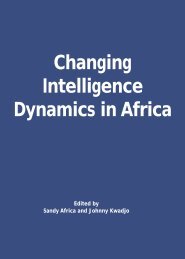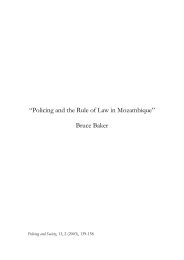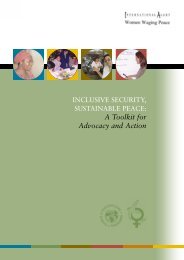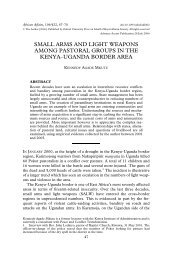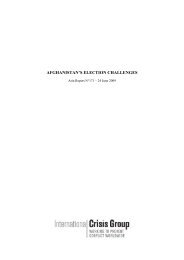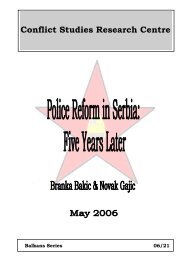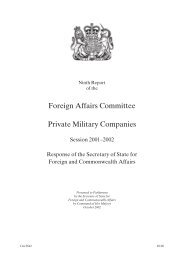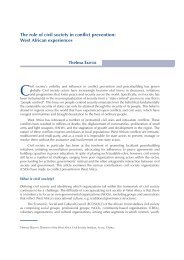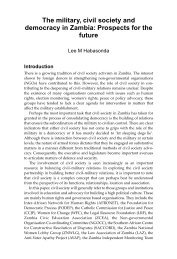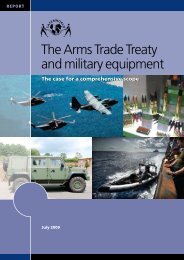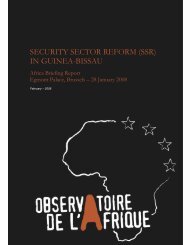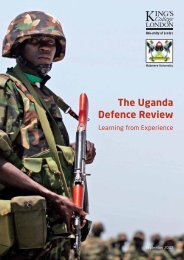promoting security sector reform in fragile states - GFN-SSR
promoting security sector reform in fragile states - GFN-SSR
promoting security sector reform in fragile states - GFN-SSR
Create successful ePaper yourself
Turn your PDF publications into a flip-book with our unique Google optimized e-Paper software.
agencies and other development assistance<br />
actors. The State-USAID jo<strong>in</strong>t<br />
strategic plan offers a clear entry po<strong>in</strong>t<br />
and the coord<strong>in</strong>ation services provided<br />
by the Office of the Coord<strong>in</strong>ator for<br />
Stabilization and Reconstruction at the<br />
Department of State may facilitate such<br />
<strong>in</strong>teractions.<br />
USAID may also want to beg<strong>in</strong> to identify<br />
other potential like-m<strong>in</strong>ded bodies<br />
with<strong>in</strong> the government and develop<br />
a strategy for build<strong>in</strong>g alliances with<br />
them.<br />
4. Develop<strong>in</strong>g a Policy and<br />
Legislative Agenda<br />
For USAID personnel to engage as fully<br />
as possible <strong>in</strong> <strong>SSR</strong> programm<strong>in</strong>g, senior<br />
USAID officials need to clearly <strong>in</strong>dicate<br />
that <strong>SSR</strong> is a priority. Additionally, policy<br />
decisions need to be taken relat<strong>in</strong>g to<br />
development’s priority <strong>in</strong> the National<br />
Security Strategy as well as constra<strong>in</strong>ts to<br />
USAID’s ability to engage fully <strong>in</strong> <strong>SSR</strong>related<br />
work. In some cases, legislative<br />
remedies may have to be pursued.<br />
5. Identify<strong>in</strong>g Research Priorities<br />
L<strong>in</strong>kages between <strong>security</strong> and development<br />
are well established, as are l<strong>in</strong>kages<br />
between unaccountable, poorly<br />
managed <strong>security</strong> forces and <strong>in</strong><strong>security</strong>,<br />
violence, and conflict. Though further<br />
research <strong>in</strong>to the potential benefits of<br />
<strong>SSR</strong> for development is not a priority,<br />
research <strong>in</strong>to two broad areas would<br />
help support <strong>SSR</strong> programm<strong>in</strong>g.<br />
The first is to exam<strong>in</strong>e systems of<br />
<strong>security</strong> <strong>sector</strong> governance <strong>in</strong> partner<br />
countries. There is ongo<strong>in</strong>g research <strong>in</strong><br />
Africa and Lat<strong>in</strong> America, but considerable<br />
scope for this work <strong>in</strong> Africa and<br />
elsewhere. 24 The second is to <strong>in</strong>vestigate<br />
why <strong>SSR</strong> processes have succeeded or<br />
failed. There is very little written on<br />
this subject, though it is fundamental to<br />
sound programm<strong>in</strong>g.<br />
Security is fundamental to people’s livelihoods,<br />
reduc<strong>in</strong>g poverty and achiev<strong>in</strong>g<br />
the Millennium Development Goals. It<br />
relates to personal and state safety, access<br />
to social services, and political processes.<br />
It is a core government responsibility,<br />
necessary for economic and social development,<br />
and vital for the protection of<br />
human rights.<br />
Security matters to the poor and other<br />
vulnerable groups, especially women<br />
and children, because bad polic<strong>in</strong>g,<br />
weak justice and penal systems, and<br />
corrupt militaries mean that they suffer<br />
disproportionately from crime, <strong>in</strong><strong>security</strong>,<br />
and fear. They are consequently less<br />
likely to be able to access government<br />
services, <strong>in</strong>vest <strong>in</strong> improv<strong>in</strong>g their own<br />
futures, and escape from poverty.<br />
Security is important for improved governance.<br />
Inappropriate <strong>security</strong> struc-<br />
24 The Stockholm International Peace Research Institute<br />
and ASDR <strong>in</strong> Ghana are collaborat<strong>in</strong>g on a<br />
project exam<strong>in</strong><strong>in</strong>g the defense budget<strong>in</strong>g process<br />
<strong>in</strong> eight African countries; see .<br />
ASDR is oversee<strong>in</strong>g a second project that seeks<br />
to develop fuller understand<strong>in</strong>g of the nature<br />
and function<strong>in</strong>g of <strong>security</strong> <strong>sector</strong> governance<br />
mechanisms <strong>in</strong> Africa, monitor<strong>in</strong>g changes<br />
<strong>in</strong> those mechanisms over time, and provid<strong>in</strong>g<br />
recommendations on how to improve the<br />
capacity, transparency, and accountability of such<br />
mechanisms. This project covers approximately<br />
a dozen African countries; see . An<br />
exam<strong>in</strong>ation of the defense budget<strong>in</strong>g process <strong>in</strong><br />
Lat<strong>in</strong> American countries under the leadership of<br />
Red de Seguridad y Defensa de América Lat<strong>in</strong>a<br />
will shortly produce f<strong>in</strong>d<strong>in</strong>gs of its first four case<br />
studies; see .<br />
tures and mechanisms can contribute to<br />
weak governance and to <strong>in</strong>stability and<br />
violent conflict, which impact negatively<br />
on poverty reduction. As the UN Secretary<br />
General notes <strong>in</strong> his September<br />
2003 report on the Millennium Declaration,<br />
“We must make even greater efforts<br />
to prevent the outbreak of violence<br />
well before tensions and conflicts have<br />
eroded polities and economies to the<br />
po<strong>in</strong>t of collapse.”<br />
OECD governments and their development<br />
actors aim to help partner countries<br />
establish appropriate structures<br />
and mechanisms to manage change and<br />
resolve disputes through democratic and<br />
peaceful means. Support for <strong>security</strong><br />
system <strong>reform</strong> (<strong>SSR</strong>) forms part of this<br />
assistance. It seeks to <strong>in</strong>crease the ability<br />
of partner countries to meet the range<br />
of <strong>security</strong> needs with<strong>in</strong> their societies<br />
<strong>in</strong> a manner consistent with democratic<br />
norms and sound pr<strong>in</strong>ciples of<br />
governance and the rule of law. Given<br />
restrictions on Official Development<br />
Assistance (ODA), <strong>in</strong>terested OECD<br />
governments may need to draw on non-<br />
ODA sources to assist activities <strong>in</strong> this<br />
area.<br />
<strong>SSR</strong> is a key component of the broader<br />
“human <strong>security</strong>” agenda, developed<br />
with leadership from the United<br />
Nations Development Programme<br />
(UNDP) and described <strong>in</strong> Human<br />
Security Now, the report of the UN<br />
Commission on Human Security. The<br />
human <strong>security</strong> agenda <strong>in</strong>cludes, for<br />
example, issues of livelihoods and social<br />
organisation of the poor that go beyond<br />
those covered here. <strong>SSR</strong> itself also<br />
extends well beyond the narrower focus<br />
of more traditional <strong>security</strong> assistance<br />
20 USAID ISSUE PAPER NO. 11



